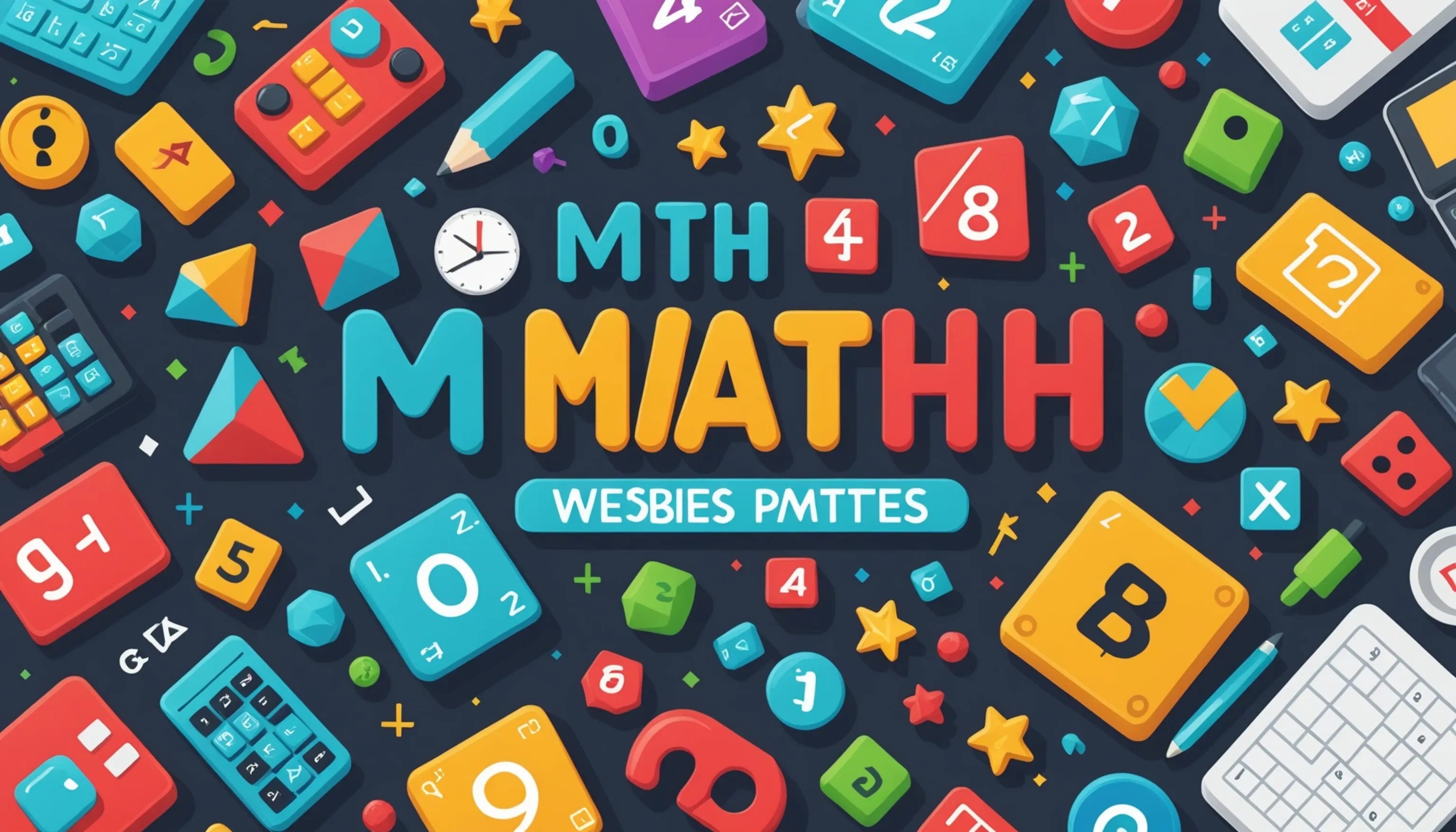Free Math Games Online for Teenagers
 HvWHenry van Wagenberg
HvWHenry van Wagenberg
Top Free Math Games Online for Teenagers
Finding engaging free math games online for teenagers can be a game-changer in making math enjoyable. Here are some top choices:
- Kahoot! - This platform offers interactive quizzes that make learning math concepts fun through competition.
- Math Playground - It features a variety of games that challenge students' math skills while keeping them entertained.
- Prodigy Math - An adventure-based game that personalizes math problems based on the player's skill level.
These games not only improve mathematical skills but also foster a love for learning.
Benefits of Online Math Games for Teens
Online math games offer a multitude of benefits for teenagers, making learning both effective and enjoyable. One of the primary advantages is that they provide an interactive and engaging environment. Unlike traditional learning methods, these games encourage active participation, which is essential for retaining mathematical concepts.
Moreover, online math games help to develop critical problem-solving skills. As teens navigate through various challenges, they learn to think critically and strategize their moves. This not only enhances their math skills but also prepares them for real-world situations where problem-solving is necessary.
Another significant benefit is the ability to personalize learning. Many online platforms adjust the difficulty level based on the player's performance, ensuring that each teen is challenged appropriately. This adaptive learning approach keeps students motivated and less frustrated, as they can progress at their own pace.
Additionally, online math games can foster healthy competition among peers. Many platforms allow students to compete against each other, whether in real-time or through leaderboards. This competitive spirit can motivate teenagers to improve their skills and engage more deeply with the subject matter.
Lastly, these games can serve as a supplementary resource for parents and teachers. By incorporating online math games into their teaching strategies, educators can make lessons more dynamic and appealing. This combination of fun and education ultimately leads to better retention and understanding of mathematical concepts.
How Math Games Improve Problem-Solving Skills
Math games are not just entertaining; they play a crucial role in enhancing teenagers' problem-solving skills. Engaging in these games requires players to think critically and make quick decisions, which are essential components of effective problem solving.
When teenagers participate in math games, they often encounter various challenges that require them to analyze situations and devise strategies. For instance, many games present puzzles that necessitate a step-by-step approach, encouraging players to break down complex problems into manageable parts. This practice helps them develop logical reasoning and analytical skills.
Moreover, math games promote a growth mindset. As teens face challenges in the game, they learn that making mistakes is part of the learning process. This understanding fosters resilience and encourages them to try different strategies until they find a solution. In essence, they learn to view problems not as obstacles but as opportunities for growth.
Additionally, these games often require collaboration when played in multiplayer formats. Working together with peers to solve problems can enhance communication and teamwork skills. Teens learn to share ideas, listen to different perspectives, and collectively devise solutions, all of which are vital in real-life scenarios.
Finally, math games can provide immediate feedback, allowing players to assess their problem-solving approaches. This instant feedback loop helps them adjust their strategies and improve their skills over time, leading to more effective problem-solving abilities both in and out of the classroom.

Popular Free Math Game Websites
Several popular websites offer free math games that engage teenagers and enhance their math skills. One of the top sites is Kahoot!, which provides interactive quizzes that make learning competitive and fun. Another favorite is Math Playground, featuring a variety of games that challenge students with different math concepts. Prodigy Math combines adventure with learning, allowing players to solve math problems to progress in the game. Lastly, Coolmath Games offers a range of math-based puzzles and games that are both entertaining and educational. These platforms make math enjoyable for teens!
Kahoot! - Fun and Interactive Math Quizzes
Kahoot! has emerged as a leading platform for creating fun and interactive math quizzes that appeal to teenagers. This game-based learning platform allows teachers and parents to design custom quizzes or choose from a vast library of existing ones. The engaging format makes learning math concepts feel more like a game rather than a chore.
One of the standout features of Kahoot! is its real-time gameplay, where students can join quizzes using their smartphones or computers. This not only encourages participation but also fosters a sense of competition among peers. As teenagers answer questions, they can see their scores update instantly, adding an exciting layer to the learning experience.
Kahoot! quizzes cover a wide range of math topics, from basic arithmetic to advanced algebra and geometry. This variety ensures that teenagers can find quizzes tailored to their skill levels and learning needs. Additionally, the platform promotes collaboration; students can work in teams to answer questions, enhancing their communication and teamwork skills.
Moreover, Kahoot! is designed to be user-friendly, making it accessible for both teachers and students. The platform also tracks individual progress, allowing educators to identify areas where students may need additional support. By incorporating Kahoot! into the classroom or at home, parents and teachers can make learning math enjoyable and effective, ultimately improving students' understanding and retention of mathematical concepts.
Math Playground - Engaging Math Challenges
Math Playground is an outstanding website that provides a plethora of engaging math challenges tailored for teenagers. This platform combines fun with education, making it an ideal resource for students looking to enhance their math skills while enjoying themselves. The site features a variety of games, puzzles, and problem-solving activities that cover essential math concepts, including addition, subtraction, multiplication, division, fractions, and more advanced topics like algebra and geometry.
What sets Math Playground apart is its interactive nature. Each game is designed to be visually appealing and user-friendly, ensuring that teenagers remain engaged and motivated to learn. For instance, students can solve math problems by navigating through colorful mazes or completing intriguing challenges that require critical thinking and strategic planning.
Additionally, Math Playground encourages a sense of achievement through its reward systems. As students progress through different levels and complete challenges, they earn points and badges, which fosters a competitive yet supportive environment. This gamified approach not only helps to reinforce mathematical concepts but also boosts students' confidence as they see their progress.
Furthermore, Math Playground is accessible on various devices, allowing teens to practice their math skills anytime and anywhere. Parents and teachers can also utilize the platform to supplement traditional learning methods, making math practice more enjoyable and effective. By integrating Math Playground into their study routines, teenagers can develop a deeper understanding of math while having fun!

Prodigy Math - Adventure-Based Learning
Prodigy Math is a captivating online platform that combines adventure-based learning with mathematical skill development, making it a popular choice among teenagers. This interactive game immerses students in a fantasy world where they embark on quests and adventures while solving math problems tailored to their individual skill levels. The unique blend of gaming and learning captures the interest of teens, motivating them to engage with math in a fun and dynamic way.
As players navigate through the Prodigy universe, they encounter challenges that require them to answer math questions correctly to progress. The game covers a wide range of topics, including arithmetic, geometry, and algebra, ensuring that students are exposed to various mathematical concepts. This adaptive learning approach personalizes the experience, allowing teens to tackle problems that align with their current understanding, while also pushing them to improve.
Prodigy Math also incorporates elements of gamification, such as earning rewards and unlocking new features, which keeps students motivated and eager to continue learning. As they solve problems, players can collect pets, customize their avatars, and compete with friends, creating a sense of community and friendly competition.
Additionally, Prodigy provides valuable insights for parents and teachers, offering progress reports that highlight students’ strengths and areas for improvement. By integrating Prodigy Math into their learning routines, teenagers can enhance their mathematical skills while enjoying an engaging and interactive adventure.
Tips for Parents and Teachers
Supporting teenagers in their math learning journey can be greatly enhanced by incorporating online math games. Here are some practical tips for parents and teachers:
- Encourage Exploration: Allow teens to explore different math games to find ones they enjoy, fostering a positive attitude towards math.
- Set Goals: Help students set achievable goals within the games, such as completing a certain number of levels or improving their scores.
- Monitor Progress: Use the tracking features available on many platforms to monitor students’ progress and identify areas needing improvement.
- Integrate with Curriculum: Relate game content to what’s being taught in class to reinforce learning and make connections.
- Limit Screen Time: Balance game play with other activities to ensure a well-rounded learning experience.
By following these tips, parents and teachers can effectively enhance the learning experience for teenagers.
How to Encourage Teenagers to Play Math Games
Encouraging teenagers to engage with math games can significantly enhance their learning experience while making math enjoyable. Here are some effective strategies to foster their interest:
1. Highlight the Fun: Emphasize that math games are not just educational but also fun. Share your own positive experiences or anecdotes from peers who have enjoyed learning math through games.
2. Create a Game Night: Organize a regular game night where family members or friends come together to play math games. This social aspect can motivate teens to participate and challenge each other in a friendly environment.
3. Set Up Challenges: Introduce friendly competitions by setting challenges or leaderboards. For instance, see who can achieve the highest score or complete the most levels in a week. This competitive spirit can ignite their interest.
4. Incorporate Technology: Allow teenagers to use their devices, as many are already comfortable with technology. Introduce them to online platforms that offer interactive math games they can easily access.
5. Provide Rewards: Consider establishing a rewards system where students earn small incentives for reaching certain milestones in their gaming. This can serve as motivation to engage with the content.
By implementing these strategies, parents and teachers can create an encouraging environment that fosters a love for math through engaging games.
Setting Limits on Screen Time
While online math games can be a valuable educational tool, it’s essential to set limits on screen time to promote a balanced lifestyle for teenagers. Here are some effective strategies for parents and teachers to consider:
1. Establish Clear Boundaries: Define specific time limits for gaming sessions. For instance, allowing an hour of math gaming after homework is completed can create a structured routine that promotes responsibility.
2. Encourage Breaks: Remind teens to take breaks every 30 to 45 minutes during gameplay. Short breaks can help prevent fatigue and maintain focus, allowing them to return to the game refreshed and ready to learn.
3. Promote Alternative Activities: Encourage participation in non-screen activities such as sports, reading, or hobbies. Balancing screen time with physical and creative pursuits is vital for overall development.
4. Use Parental Controls: Leverage parental control tools available on many devices to monitor and limit screen time effectively. This can help enforce the rules and prevent excessive gaming.
5. Lead by Example: Model healthy screen habits yourself. Demonstrating a balanced approach to technology use can set a positive example for teenagers to follow.
By implementing these strategies, parents and teachers can ensure that teenagers enjoy the benefits of math games while maintaining a healthy relationship with screen time, ultimately supporting their academic success and well-being.
